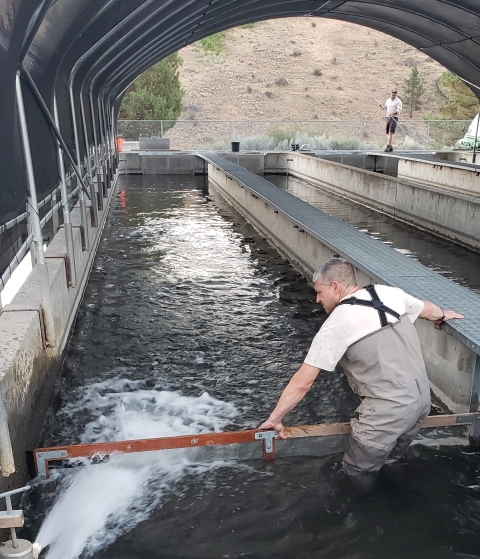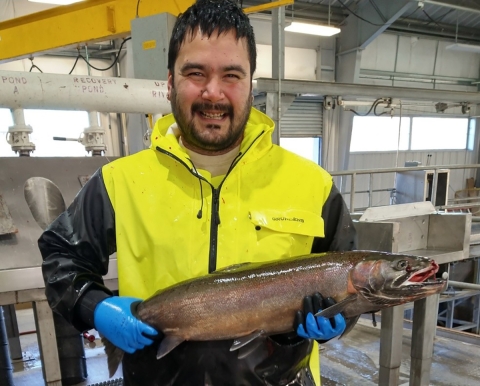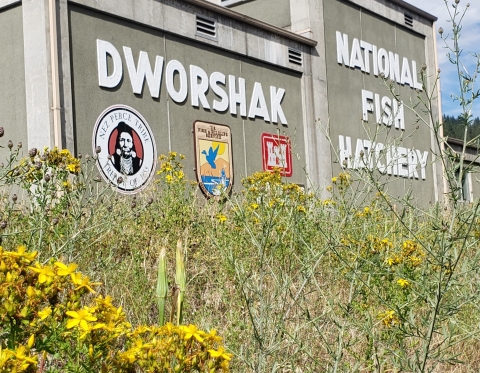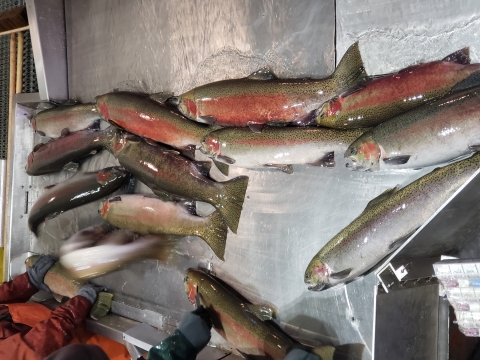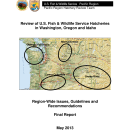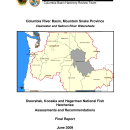Overview: In the past 160 years, habitat alterations, hydroelectric development and consumptive fisheries have impacted most of the salmon and steelhead trout populations in the Pacific Northwest. To mitigate for those impacts, hatcheries have been used to increase the number of fish available for harvest. However, long-term conservation needs of natural salmonid populations and their inherent genetic resources require a re-examination of the role of hatcheries in basin-wide management and conservation strategies.
Background: In May 2005, the U.S. Fish and Wildlife Service (Service) initiated a series of hatchery reviews to assure that its Pacific Northwest hatchery programs are part of a scientifically-sound and integrated strategy — consistent with Tribal, State nd other Federal strategies — for conserving wild stocks and managing fisheries in watersheds within the Region. The reviews, tailored after a successful process implemented in Puget Sound and Coastal Washington watersheds, examined 53 hatchery programs at 24 federally-owned hatcheries in Idaho, Oregon, and Washington. They were completed in January 2011. The first of these reviews was a pilot in May 2006, of the Warm Springs National Fish Hatchery; a spring Chinook hatchery located in the Deschutes River Basin of central Oregon. The report series ended with (USFWS) regionwide issues, guidelines, and recommendations for the region's hatcheries within the National Fish Hatchery System.
Our Method: We believe the hatchery review process developed in western Washington provided both a solid template and operational tools (e.g., software spreadsheets, population dynamic models) for reviewing Service hatcheries in the Columbia River Basin and on the Olympic Peninsula. We also have found that much of the background information necessary for reviewing Service hatcheries in the Pacific Region had already been compiled in Hatchery and Genetic Management Plans, Comprehensive Hatchery Management Plans and the Artificial Propagation Review and Evaluation (APRE) database developed by the Northwest Power and Conservation Council (NWPCC).
The Team: The Hatchery Review Team, comprised of Service and other federal scientists (from NOAA-Fisheries and the U.S. Geological Survey) conducted field tours with hatchery managers and their staffs, reviewed hatchery operations, and met with the comanaging agencies and tribes to gain a clear understanding of the goals for and status of each wild and hatchery population and associated habitat and management strategies. The Review Team applied the Puget Sound and Coastal Washington Hatchery Scientific Review Group's scientific framework and hatchery review tools to develop reform recommendations for each hatchery program.
The Reports:
Regionwide Reports and Recommendations (2010; 2013)
- Summary and Overview of the U.S. Fish & Wildlife Service Federal Hatchery Review (October 2010)
- Final Report: Region-Wide Issues, Guidelines, and Recommendations (May 2013)
Warm Springs National Fish Hatchery (2006)
- Warm Springs NFH Review (Final Report and Appendix A)
- Warm Springs NFH Review (Final Report Appendix B)
- Warm Springs NFH Review (Final Report Appendix C)
- Warm Springs NFH Review (Final Report Appendix D)
Columbia Gorge National Fish Hatcheries (2007)
- Columbia Gorge NFHs Review (Final Report)
- Columbia Gorge NFHs Review (Final Report Summary)
- Columbia Gorge NFHs Review (Final Report Appendix A)
- Columbia Gorge NFHs Review (Final Report Appendix B)
- Columbia Gorge NFHs Review (Final Report Appendix C)
- Columbia Gorge NFHs Review (Final Report Appendix D)
- Columbia Gorge NFHs Review (Final Report Appendix E)
Eagle Creek National Fish Hatchery (2007)
- Eagle Creek NFH Review (Final Report)
- Eagle Creek NFH Review (Final Report Summary)
- Eagle Creek NFH Review (Final Report Appendix A)
- Eagle Creek NFH Review (Final Report Appendix B)
- Eagle Creek NFH Review (Final Report Appendix C)
- Eagle Creek NFH Review (Final Report Appendix D)
- Eagle Creek NFH Review (Final Report Appendix E)
Leavenworth National Fish Hatchery Complex (2007)
- Leavenworth Complex Review (Final Report)
- Leavenworth Complex Review (Final Report Summary)
- Leavenworth Complex Review (Final Report Appendix A)
- Leavenworth Complex Review (Final Report Appendix B)
- Leavenworth Complex Review (Final Report Appendix C)
- Leavenworth Complex Review (Final Report Appendix D)
- Leavenworth Complex Review (Final Report Appendix E)
Puget Sound - Olympic Peninsula National Fish Hatcheries (2009)
- Olympic Peninsula NFHs (Final Report)
- Olympic Peninsula NFHs Review (Final Report Summary)
- Olympic Peninsula NFHs Review (Final Report Appendix A)
- Olympic Peninsula NFHs Review (Final Report Appendix B)
- Olympic Peninsula NFHs Review (Final Report Appendix C)
- Olympic Peninsula NFHs Review (Final Report Appendix D)
Lower Snake River Compensation Plan (LSRCP) National Fish Hatcheries (2009)
- Lower Snake NFHs (Final Report)
- Lower Snake NFHs Review (Final Report Summary)
- Lower Snake NFHs Review (Final Report Appendix A)
- Lower Snake NFHs Review (Final Report Appendix B)
- Lower Snake NFHs Review (Final Report Appendix C)
- Lower Snake NFHs Review (Final Report Appendix D)
- Lower Snake NFHs Review (Final Report Appendix E)
- Lower Snake NFHs Review (Final Report Appendix F)
- Idaho LSRCP Hatcheries (Final Report)
- Idaho LSRCP Hatcheries (Final Report Summary)
- Idaho LSRCP Hatcheries Review (Final Report Appendix A)
- Idaho LSRCP Hatcheries Review (Final Report Appendix B)
- Idaho LSRCP Hatcheries Review (Final Report Appendix C)
- Idaho LSRCP Hatcheries Review (Final Report Appendix D)
- Idaho LSRCP Hatcheries Review (Final Report Appendix E)
- Idaho LSRCP Hatcheries Review (Final Report Appendix F)
Oregon LSRCP Hatcheries (2011)
- Oregon LSRCP Hatcheries (Final Report)
- Oregon LSRCP Hatcheries (Final Report Summary)
- Oregon LSRCP Hatcheries (Final Report Appendix B)
- Oregon LSRCP Hatcheries (Final Report Appendix C)
- Oregon LSRCP Hatcheries (Final Report Appendix D)
- Oregon LSRCP Hatcheries (Final Report Appendix E)
Washington LSRCP Hatcheries (2011)
- Washington LSRCP Hatcheries (Final Report)
- Washington LSRCP Hatcheries (Final Report Summary)
- Washington LSRCP Hatcheries (Final Report Appendix B)
- Washington LSRCP Hatcheries (Final Report Appendix C)
- Washington LSRCP Hatcheries (Final Report Appendix D)
- Washington LSRCP Hatcheries (Final Report Appendix E)


